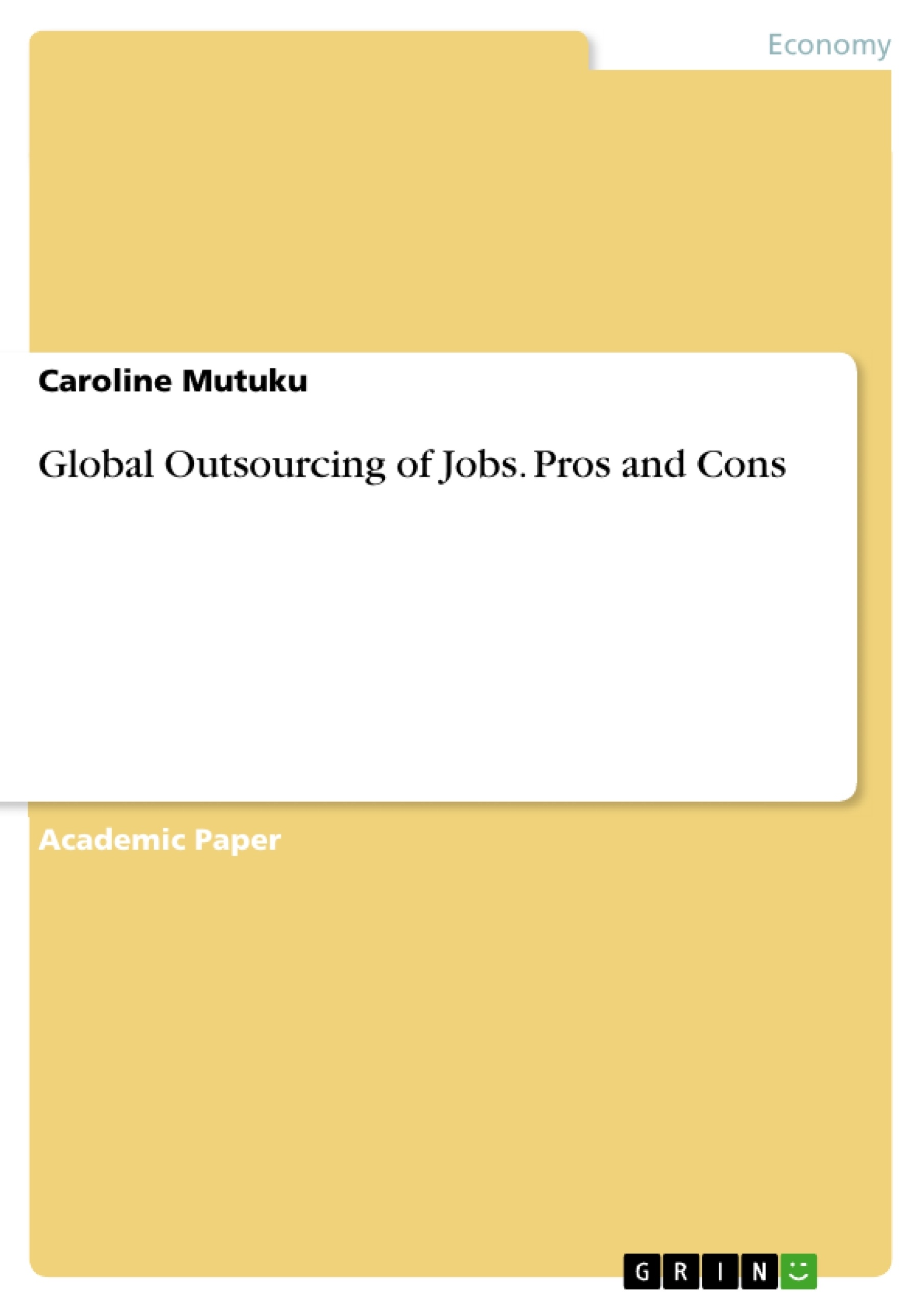Global outsourcing of jobs is one of the most debated topics in management studies over the years because of the increasing concerns on economics perspective, technological perspective, organizational perspective, political perspective, and strategic perspective. Research shows that the labour market abroad has been increasing over the years thus posing an economic challenge at home, and this is the reason why most of the firms both large and small outsource jobs for instance, professional services in the less expensive labour markets abroad. Most of the leading firms across the globe outsource most of the jobs for instance, professional services so as to achieve a competitive advantage. However, most of these firms are faced with the need to examine the long-term impacts on the business and the society (both pros and cons of global outsourcing of jobs) for competitive advantages.
From an economic perspective, it is argued that cost consideration is the most prominent decision making factor in any organization as most of the managers aim at minimizing the cost of operation so as to achieve a competitive edge in the global market because the goods and services are made competitive in the global market. However, there are those who argue that global outsourcing of jobs results into permanent job loss home, and this has an impact on the society where these firms operate. That said, global outsourcing of jobs needs to be analyzed in details in order to examine the benefits and costs associated with it before making outsourcing options. The research paper will, therefore, analyze some of the pros and cons of global outsourcing of jobs which can be used by managers as they make their outsourcing options for competitive advantage in the global market.
Table of Contents
- Introduction
- Pros of Global Outsourcing of Jobs
- Cons of Global Outsourcing of Jobs
- Conclusion
- References
Objectives and Key Themes
The research paper examines the advantages and disadvantages of global outsourcing of jobs for businesses and society, focusing on the economic, technological, organizational, political, and strategic perspectives.
- The economic benefits and drawbacks of global outsourcing
- The impact of outsourcing on job markets in developed and developing countries
- The role of comparative advantage in global outsourcing
- The relationship between outsourcing and international trade
- The challenges and opportunities associated with global outsourcing
Chapter Summaries
Introduction
The introduction outlines the importance of global outsourcing of jobs in management studies, highlighting the growing concerns from various perspectives, such as economics, technology, and politics. The paper aims to analyze the pros and cons of global outsourcing to provide insights for managers making outsourcing decisions for competitive advantage.
Pros of Global Outsourcing of Jobs
This chapter explores the economic benefits of global outsourcing, drawing upon the comparative advantage theory by David Ricardo. It emphasizes the cost savings achieved through accessing cheaper labor in developing economies, illustrating this with examples of US firms outsourcing professional services to countries like India. The chapter also discusses the positive impact of outsourcing on international trade and economic growth in emerging economies.
Frequently Asked Questions
What are the main pros of global outsourcing for firms?
The primary benefit is cost reduction by accessing cheaper labor markets abroad, which allows firms to achieve a competitive advantage in the global market.
What are the cons of global outsourcing for the home society?
A major disadvantage is the potential for permanent job loss in the home country, which can have significant social and economic impacts on the local community.
How does David Ricardo's comparative advantage apply to outsourcing?
The theory suggests that countries should specialize in producing goods or services where they have a lower opportunity cost, justifying the outsourcing of professional services to developing economies.
What perspectives are considered in the outsourcing debate?
The paper examines outsourcing from economic, technological, organizational, political, and strategic perspectives to understand its long-term impacts.
Does global outsourcing affect international trade?
Yes, it generally promotes international trade and can stimulate economic growth in emerging economies like India by creating new professional service sectors.
Why is cost consideration the most prominent factor in outsourcing?
Managers aim to minimize operational costs to make their goods and services more competitive globally, which is often the driving force behind the decision to outsource.
- Citar trabajo
- Caroline Mutuku (Autor), 2018, Global Outsourcing of Jobs. Pros and Cons, Múnich, GRIN Verlag, https://www.grin.com/document/430699



